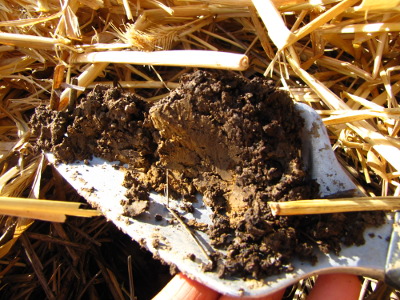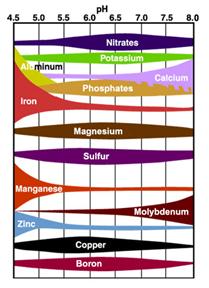
Soil pH
 I'm not going to write about
the fundamentals of pH because I figure
most of you know:
I'm not going to write about
the fundamentals of pH because I figure
most of you know:
- 7 is neutral
- 0 to 6.9 is acidic
- 7.1 to 14 is alkaline (aka basic)
To some
extent, your pH is determined by the bedrock under your soil, but
management will also impact soil pH. For example, take a look at
my test results:
| Mule (1) | Mule (2) | CP3 (3) | Back (4) | Front (5) | Mom front | Mom back | |
| pH | 7.5 | 7.6 | 6 | 7.3 | 7.4 | 7 | 7.3 |
| CEC | 65.6 | 74.4 | 15.6 | 56 | 47.1 | 27.9 | 36.3 |
Notice that the mule garden --- just a few feet away from the chicken pasture (highlighted in yellow) has alkaline soil instead of acidic soil. Soil in both spots was identical a few years ago, and I've never added lime or large amounts of wood ashes to my soil. What I have done is topdress the mule garden with compost and manure in huge quantities, which seems to have sweetened the soil (despite various sources that report compost sours soil.)
 Depending
on which crops you're trying to grow, the perfect pH for most
garden plants ranges from 6 to 7 (although you'll want much more acidic
soil for blueberries.) pH is extremely important because it
determines the availability of many nutrients, as you can see in the
chart to the left. Each type of plant has evolved to deal with
specific micronutrient ranges, and a pH too high or too low can lead to
deficiencies
of some nutrients and toxic overabundances of others.
Depending
on which crops you're trying to grow, the perfect pH for most
garden plants ranges from 6 to 7 (although you'll want much more acidic
soil for blueberries.) pH is extremely important because it
determines the availability of many nutrients, as you can see in the
chart to the left. Each type of plant has evolved to deal with
specific micronutrient ranges, and a pH too high or too low can lead to
deficiencies
of some nutrients and toxic overabundances of others.If you're worried about the pH of your soil, the first thing you should do is to look at your CEC. Although a high CEC is generally a good thing, the value also means that the soil is very resistant to changes in pH. Raising the pH of my chicken pasture soil would be relatively easy due to its low CEC, but lowering the pH of my garden soil would be much tougher because of the high cation exchange capacity in that rich soil.
For now, I'm going to leave my soil pH alone, but I will probably opt to test the soil every year and keep an eye on this figure since a much higher pH could be problematic. Traditionally, soil pH is raised with lime and lowered with sulfur, but due to my high CEC, I would probably opt to apply acidic organic matter instead if I wanted to lower my garden pH. I suspect my chicken pasture will become more alkaline naturally as chicken manure and plant debris enrich the ground.
Our chicken waterer keeps the flock active,
tempting them to the far end of the pasture for a sip of clean water.
| This post is part of our Holistic Soil Test Analysis lunchtime series.
Read all of the entries: |
Want more in-depth information? Browse through our books.
Or explore more posts by date or by subject.
About us: Anna Hess and Mark Hamilton spent over a decade living self-sufficiently in the mountains of Virginia before moving north to start over from scratch in the foothills of Ohio. They've experimented with permaculture, no-till gardening, trailersteading, home-based microbusinesses and much more, writing about their adventures in both blogs and books.
Want to be notified when new comments are posted on this page? Click on the RSS button after you add a comment to subscribe to the comment feed, or simply check the box beside "email replies to me" while writing your comment.
RSS
comment 1
Thanks, you guys! I am learning just a s much here as I am in my soil science management class.
Comment by
Paula B.
— Fri Nov 11 17:52:04 2011
- Remove comment
In depth soil
Thanks for saying that! I hoped the lunchtime series wasn't too hard-core. I needed to get all of the cool technical stuff out of my system so I could pare it down to the more understandable basics for the soil test section of the book. 

Comment by
anna
— Sat Nov 12 11:16:15 2011
- Remove comment
Add a comment
